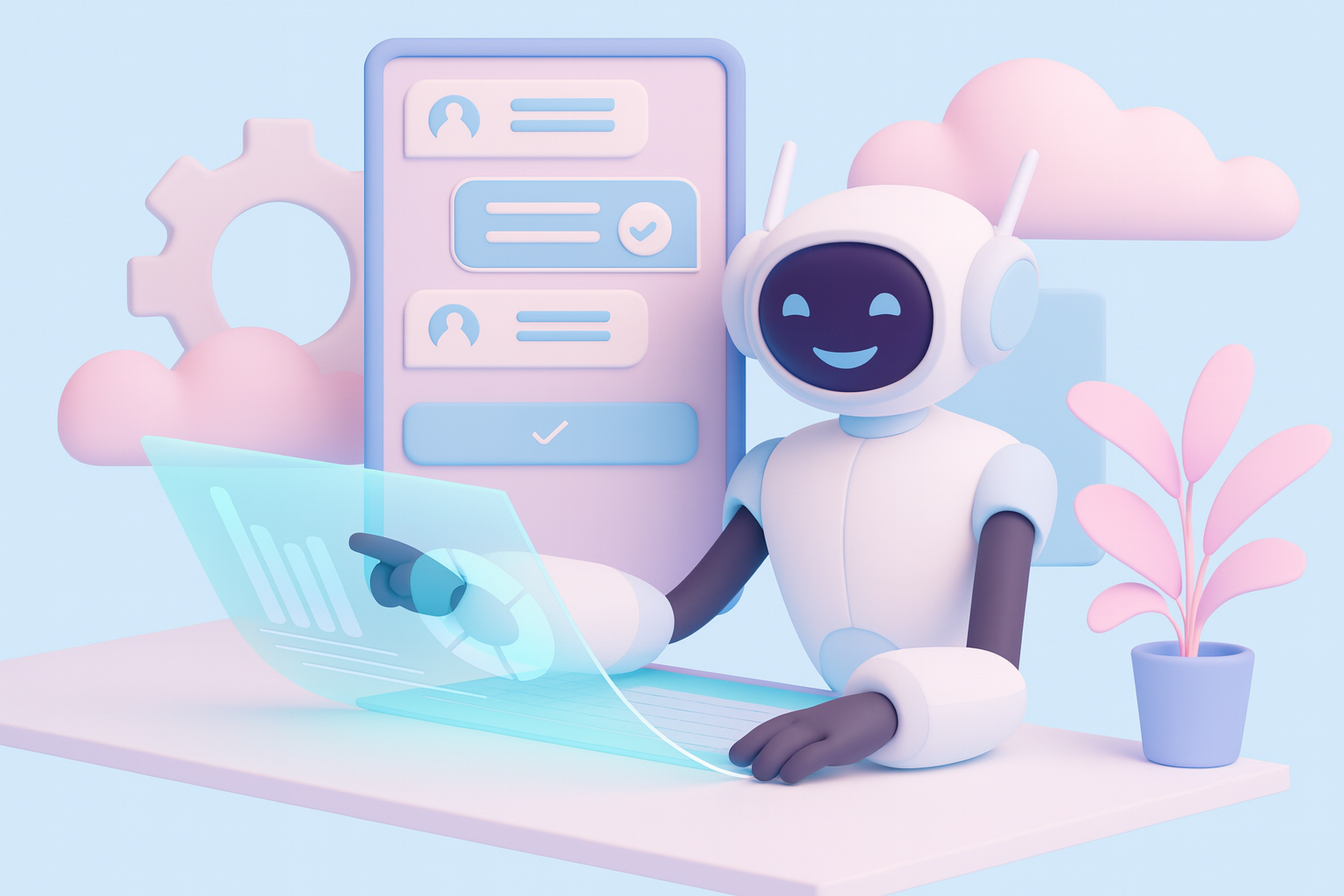The challenges of unexpected downtime, fluctuating demand, shortages of employees, supply-chain challenges, and narrowing margins are just some advanced problems that manufacturers are left with after Industry 4.0 and digital transformation.
Introduce AI agents: self-directing, decision-making software, which is real-time, learns, and acts on behalf of the business.
In this blog post, we will explore what is meant by AI agents in manufacturing, why they matter, the key advantages and main applications, and, last but not least, how they can be implemented, for example, in a CRM/ERP environment such as Salesforce.
What Are AI Agents Manufacturing?
- An AI agent is code that receives inputs in the environment, processes them, makes decisions on what to do, and sometimes autonomously and sometimes in collaboration with humans. In manufacturing, data flowing through agents of machines and IoT sensors, ERP/MES, quality systems, supply chains, and even CRM/service records are tapped.
- These agents do not stick to fixed rules like those of fixed-rule automation: they learn the results, respond to newer circumstances, and constantly streamline processes. Imagine a digital assistant connected to your line controls and Salesforce Service/Field Service, which notices abnormal motor vibration, orders the correct part, rearranges downstream schedules, and records the incident without a human involved.
- On Salesforce, Agentforce for Manufacturing makes this a reality with Data Cloud and ERP/MES/IoT feeds and industry workflows to enable manufacturers to have digital employees assist in production, services, and inventory.
Key Benefits of AI Agents in Manufacturing
1. Increased operation and throughout
Continuous monitoring of operations and real-time corrections by AI agents will decrease downtime, streamline the production processes, and maximize resource utilization. As an example, once the performance of a machine begins to decline, an agent can redistribute some load across machines, reschedule the tasks, or even initiate maintenance even before a complete breakdown occurs.
2. Less downtime and maintenance cost
Conventional reactivity (respond after failure) or even preventive maintenance (scheduled at a time) is subject to optimization.
AI agendas serve predictive maintenance: predicting breakdowns and causing the corresponding maintenance countermeasures in advance.
The outcome: the number of unexpected stoppages will decrease, the life cycle of assets will be longer, and more effective use of spare parts will be achieved.
3. Improved quality inspection and reduction of defects
The effects of quality problems include scrap, rework, customer returns, and reputational risk are expensive to contain.
AI agents with computer vision, sensor data, and real-time analytics will be able to identify anomalies and intervene, adjust real-time parameters, and, thus, keep the levels of quality higher.
4. Optimal inventory and supply chain performance
The manufacturing process requires the right parts, components, and materials at the right time.
The AI agents can track inventory, predict demand, automatically reorder or reroute supplies, and change production schedules, depending on supply limitations.
This translates to reduced carrying costs, reduced stockouts, and reduced wastages.
5. Sustainability, resources, and energy benefits
As pressure on sustainability increases, AI agents will have a role to play. They can monitor energy usage, control the use of machines, optimize material use, and minimize waste. Such benefits are not only cost savings, but also green-manufacturing objectives.
6. Close the skills gap and speed up digital transformation
Most manufacturers are experiencing labor issues: a shortage of skilled labor, the ageing workforce, and increasing complexity.
The agents assist by automating the routine decision-making process, permitting less specialized employees to operate, and permitting human teams to concentrate on more valuable tasks.
7. More agile and improved decision-making
With the help of real-time data and analytics, AI agents can offer insights and actions that enable manufacturers to react to disruptions (supply delays, demand volatility) in a quicker way. This agility is a competitive advantage.
Use Cases: AI Agents in Action in Manufacturing
Predictive Maintenance and Reliability of Assets
- The agents of AI are constantly on the lookout for sensor data and identify anomalies, and predict failures before they occur. One of them anticipated a bearing failure 72 hours ahead of time at a steel plant, which initiated ordering parts and schedule adjustments to avoid the downtime. This is in direct relation to Salesforce Field Service to create and track work orders automatically.
Real-Time Quality Control
- Defects are immediately identified through sensor and image data that is analyzed by agents. As an illustration, in a bottling plant, an agent autonomously changed the calibration during the process to minimize waste by detecting misshapen bottles. This is associated with customer quality tickets or warranty triggers in Service Cloud in Salesforce.
Dynamic Scheduling and Optimization of workflow
- The AI agents rearrange jobs and redistribute workloads when the demand or supply changes. When production had to continue uninterrupted, one of the tasks to be rerouted in a fabrication plant was the delay of raw materials. In Salesforce Manufacturing Cloud, this type of data has the ability to automatically update predictions and sales commitments.
Optimization of Inventory and Supply Chain
- Agents track stock quantities, forecast replenishment, and automatically reorder. One was used by an automotive parts manufacturer to monitor inventory across locations in order to reduce stoppage risk. This is allied to Salesforce vendor-management and procurement capabilities.
Sustainability Optimization of Energy
- Agents can minimize power wastage by monitoring energy meters and machine usage. The reduction in consumption occurred in a textile plant agent that changed operations to real-time needs. CRM dashboards can be fed with sustainability data to report on the enterprise.
Automation of Workforce and Services
- Field service AI agents can create work orders, assign engineers, and monitor the location of spares. The Agentforce platform of Salesforce offers ready-made agents that support the planners and service teams to improve compliance with SLA.
Smart Factory Operations
- In more developed facilities, several AI agents can work together to observe health, logistics, and scheduling optimization to form a so-called digital workforce. This integration of CRM, ERP, and production systems is the future of smart manufacturing.
Implementation Strategies: From Pilot to Production
The implementation of AI agents in the manufacturing industry does not happen on a silver platter and would require proper planning, data preparation, and management of change.
The following is a brief strategy that Salesforce consultants and manufacturing leaders can use to transform ideas into value:
1. Identify Use Cases
- Start with high-impact areas that could be managed, e.g., recurring times of downtime, quality problems, or frequent stock-outs. Give higher priority to those areas where there is already reliable data, i.e., in the integration of Manufacturing Cloud, Field Service, or Service Cloud.
2. Assess Data Readiness
- Make sure there is clean real-time data on MES, IoT, ERP, and CRM. In Salesforce, it is possible to connect manufacturing data to Data Cloud and verify API triggers to implement automated actions such as work orders or inventory updates.
3. Select Technology & Partner
- Select a platform and collaborate with profound manufacturing and Salesforce knowledge. The Agentforce Manufacturing is faster to implement using ready-made workflows and templates.
4. Develop a Pilot Program
- Begin lean- one production line or asset type. Set KPIs (e.g., a reduction in downtime or a reduction in defects), test the output, optimize the logic of the agent, and only when it is satisfactory, do scale.
5. Manage Change & Build Skills
- Provide training to train operators, planners, and service teams on the way agents work and human supervision requirements. Bring CRM and field teams together regarding the place of AI-driven alerts and tasks in their processes.
6. Monitor, Refine & Scale
- Measure performance, enhance decision reasoning, and diversify across lines, plants, or geographies. At Salesforce, optimize Salesforce Manufacturing Cloud and Service Cloud dashboards and alert logic to monitor ROI.
7. Enforce Governance and Provide Security
- Maintenance of privacy, auditability, and cybersecurity. Share policies, activity history, and audit of agents, HIPAA/regulatory compliance, Salesforce.
Challenges and Mitigation
Although AI agents have huge potential, manufacturers and implementation partners need to expect the main challenges:
- Legacy Systems & Fragmented Data: A significant number of plants still use unconnected MES /ERP systems or manual data.
- Mitigation: Data integration and cleanup should be given importance at an early stage.
- Hyperactive Scope: Trying to do all the automation at once may put the project in a standstill.
- Mitigation: Start with small, high-impact pilots that are clearly shown to have business value.
- Gaps in Change Management: The teams might distrust or disregard the recommendations of AI agents.
- Mitigation: Maintain human engagement, be open and communicative, and establish trust by first winning.
- Complexity of Integration: Agent triggers, inventory systems, and CRM workflow maps can be challenging to map.
- Mitigation: Select platforms with well-developed API and collaborate with seasoned Salesforce-manufacturing integration partners.
- Lack of clarity in ROI: There are companies that have challenges in measuring output or rationalizing investment.
- Mitigation: Set KPIs beforehand, monitor measurable outputs, and tie them to such business objectives as downtime reduction or cost savings.
- Cybersecurity and Safety risks: Autonomous operations in the production setting are threatening operations.
- Mitigation: Have human controls on critical decision-making, conduct heavy testing, and ensure high levels of OT/IT network separation.
Why Salesforce Partners and Consultants Matter
With the consideration of AI agents that organizations are investigating in the manufacturing industry, the importance of having a trusted partner becomes apparent. A successful Salesforce consulting partner contributes to this point:
- Knowledge of domain: Knowledge of manufacturing processes, asset/service life cycles, and tasks that are critical to supply chains.
- Knowledge of systems integration: Relating MES/IoT data streams to Salesforce Data Cloud, which will initiate flows in Manufacturing Cloud, Field Service, and Service Cloud.
- Scalability and customization: Agent logic customization, dashboard and alerts creation, geographical/line scaling.
- Governance & change-management support: To make sure it is adopted, training employees, and processes are embedded based on agent workflows.
- ROI and business alignment: Assisting in formulating quantifiable business results, analyzing KPIs, and testing.
The trip from conventional automation to agent-based intelligence is not a simple one for most manufacturing organizations. It is a strategic asset to have a partner bridging the data available at the factory floor to CRM/service workflow.
Conclusion
The manufacturing industry is at a crossroads. The combination of AI agents opens a whole new level of operational excellence: real-time decisions, self-adapting working processes, and continuous enhancement.
The opportunity is particularly high when it comes to manufacturers who use Salesforce platforms- or intend to combine CRM, service and production, and supply-chain data.
The organizations can achieve the benefits by prioritizing the correct use-cases, designing the data and system to be ready, piloting, and scaling with the suitable partner: decreased downtime, better quality, lower cost, more agile production, and better sustainability.
Being a CRM/manufacturing consultant, I would say that the competitive advantage of smart agents that allow the company to have synergy between manufacturing functions and customer/service processes is a key competitive edge of progressive businesses.








